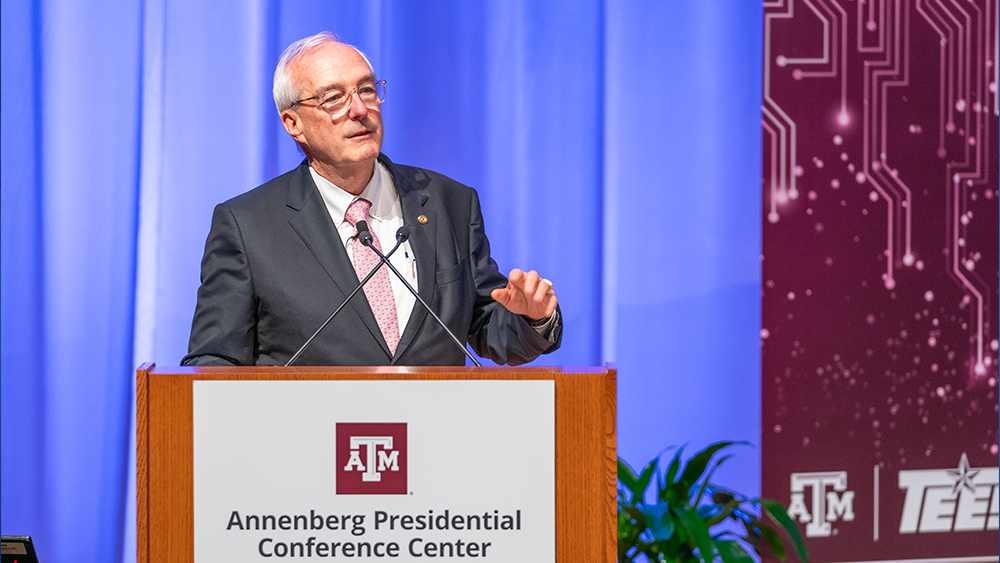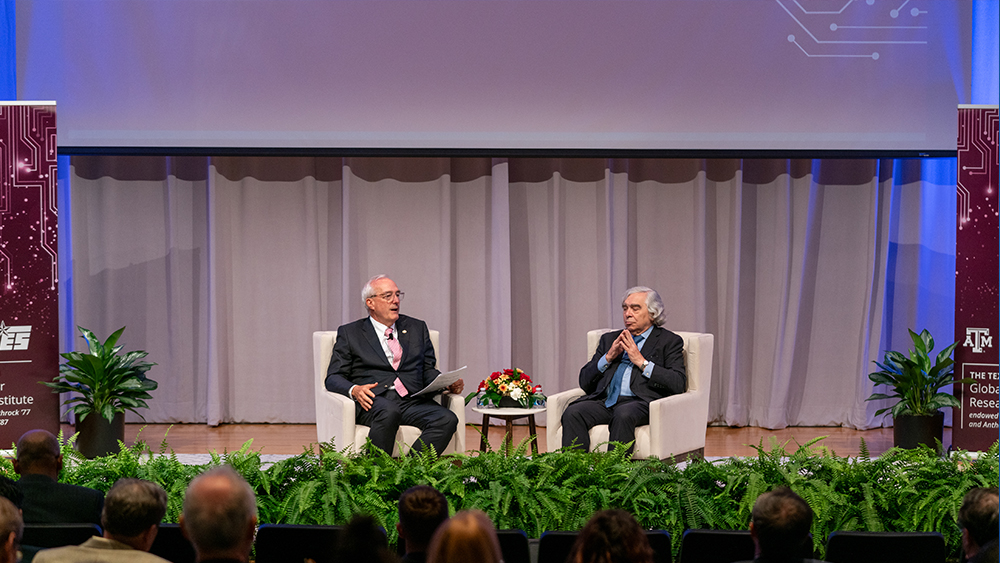Cybersecurity is all around us. From transportation to healthcare to power grids, cyber systems are an integral part of the world and impact our lives every day. With technology rapidly advancing, safeguarding digital security in today’s world is more vital than ever.
Leading the effort to train and encourage individuals in all spheres of academia to embrace cybersecurity are former students Ray Rothrock ’77 and Anthony Wood ’87. Through their generous $10 million donation, Rothrock and Wood created the Texas A&M University Global Cyber Research Institute (GCRI). The institute will focus on cross-disciplinary collaboration, research engagement, education and workforce development and community outreach. The institute aims to contribute to many aspects of cybersecurity and resilience, including technology development, law and policy, computing and engineering fundamentals.
On Sept. 28, Texas A&M held the inaugural GCRI Summit at the Annenberg Presidential Conference Center. Graduate students’ research posters lined the conference room, already showcasing the education initiatives of the GCRI and signaling innovative research to come. Distinguished guests such as U.S. Secretary of Energy and co-chairman of the Nuclear Threat Initiative Ernest Moniz and leading industry professionals filled the auditorium to glean future pursuits for this promising institution.
GCRI is a collaboration between Texas A&M’s Division of Research and the Texas A&M Engineering Experiment Station (TEES). The institute will carry out cutting-edge research on topics such as government and corporate cyber vulnerabilities, effective security policy and methods of developing and maintaining the nation’s infrastructure in the face of mounting cyber threats.
"Cyber threats incur a cost to the state of Texas and its people. Addressing these cybersecurity challenges requires a unified effort that transcends boundaries and unifies government, industry and academia," said Dr. Jack G. Baldauf, vice president for research at Texas A&M. "Our comprehensive cybersecurity expertise makes Texas A&M ideally suited for this mission. GCRI will train students and professionals to conduct cutting-edge, cross-disciplinary research to address cybersecurity challenges while fostering technology creation and industry engagement."
Within the next year, the institute plans to initiate collaborative research on cybersecurity technology and policy, develop workforce and education programs, work closely with the external advisory council, continue the seed-grant program and engagements with state and federal agencies, form an industry-engagement portfolio and invite partnerships to build their team.
The GCRI aspires to give everyone a chance to learn about cybersecurity, whether they have a background in it or not. That way, they can understand the risks of living in a digital world and better equip themselves for the future.

“Our world is becoming more and more digital,” Rothrock said. “Every one of us has cell phones. We need to treat the digital world like we treat water, air and food that we consume. It has to be safe. It has to be clean. It has to be nutritional. If you're going to operate in the world today, you need to have basic knowledge of cybersecurity.
“My dream is to integrate cybersecurity education in schools just as we teach kids to comb their hair, wash their hands and clean their fingernails so that they learn a little bit about changing their passwords and upgrading their software. I want it to just be part of life.”
For this dream to become a reality, the institute needed a strong leader. The donors found no better person to lead the effort than Dr. Sandip Roy, an electrical and computer engineering professor and new director of the GCRI.
“The GCRI is the result of the generous donation of Ray Rothrock and Anthony Wood,” Roy said. “Their vision is to create a world leader in cybersecurity at Texas A&M. Cybersecurity institutes are sort of everywhere right now. It’s a huge topic. However, Texas A&M is exceptional at examining the ways in which the cyber world connects to the physical world, our infrastructures and institutions, the national defense, and the everyday lives of people. The hope for the institution is to create a leading effort in that space.”
In 2019, there were around 400,000 cybersecurity job openings in the United States. Today, there are more than two million. Digital security issues are growing, and the world is only becoming more digital. Rothrock envisions the GCRI preparing hundreds of individuals for cyber-related jobs in just five years.
“I hope that because of Texas A&M’s uniqueness with the Corps of Cadets and its access to the Department of Defense and the national laboratories, the thousands of students coming through here get a little something from our institute and carry it out into the world,” he said.
Electrical and Computer Engineering interim department head and professor Dr. Costas Georghiades was appointed interim director of the GCRI when it was first created in 2021. At that time, preparations were made before the project was officially established. Seed grants were produced, an advisory board was created, a seminar series was launched and student-run programs were kickstarted.
“I would like to thank our alumni whose endowment made this important institute possible,” Georghiades said. “Given Texas A&M’s culture of national service and the importance of cyber defense and resiliency to national and economic security, the creation of GCRI has filled an important need.”

GCRI advisor council member Wen Masters, who worked in the Office of Naval Research and is now the vice president of cyber technologies for The MITRE Corporation, stressed the importance of the GCRI’s educational impact. The objective is to cultivate not only high school and college students but anyone in the community, and eventually globally, who wants to learn more about cybersecurity.
“Cyber is an integral part of everything, and we must tackle it,” she said. “We also cannot emphasize the educational aspect of the institute enough.”
By enhancing cybersecurity practices, Roy and his team strive to create impacts in the lives of individual consumers that someday reach the nation and, ultimately, the world.
“Our donors know what needs to get done for the world,” said GCRI Advisory Council Member Emilian Papadopoulos. “They are very experienced professionals who helped generate the idea, and their contribution is huge. It's also incredibly uplifting and rewarding anytime you get the chance to engage with students.”
The GCRI will collaborate with the Texas A&M Cybersecurity Center and TEES to form industry partnerships, especially with those that impact national security.
“The mission of the institute is to provide thought leadership, engagement, education, policy and actionable research on the topic of cybersecurity to enable a safer global society where the rule of law prevails,” Rothrock said.